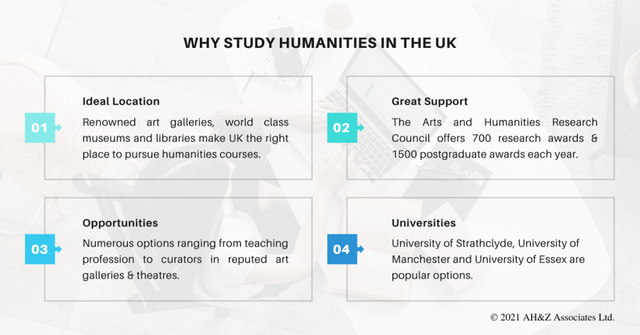Are humanities degrees in the UK still worthwhile? | AHZ Associates

When people are deciding which academic path to take at university, they are frequently put off by well-meaning people. They argue that technical or vocational studies are more likely to lead to a well-paying job. As a result, people who are passionate about a humanities subject frequently choose a less important subject. For example, suppose you want to study art and design in the United Kingdom but are being persuaded to study law instead.
The Study of Humanities in the UK
Humanities research in the United Kingdom is focused on the study of human behaviour and interaction in its various social, cultural, environmental, economic, and political contexts. In the United Kingdom, the Humanities degree considers past, present, and future challenges in both individual and global settings. Perhaps the subject didn't matter when only a few people went to university. A university degree is almost always required for a rewarding career, and subjects with no immediate practical application are frequently less appealing.
What qualities and abilities do you need to succeed in a Humanities course?
To succeed as a professional in the Humanities degree in the UK, you'll need a diverse set of skills. These abilities, among many others, will be useful for a job in the humanities.
Communication skills:
Any lawyer must be able to express themselves in writing. To present information in an understandable, clear, and rational manner, strong communication skills, whether verbal or written, are required. As a lawyer or attorney, you won't get very far unless you have excellent verbal and written communication skills, both in court and when drafting letters and other legal documents.
Questioning:
Your ability to ask pertinent questions is directly related to your professional performance as a lawyer. You'll need to know how to ask questions effectively in a variety of situations, ranging from casual conversations with coworkers and clients to cross-examination of witnesses on the stand.
Evaluating skills:
A large amount of material and data must be read on a daily basis when working in the humanities. It is critical to sort through the mountain of data and determine what truly matters in order to avoid missing critical details. Conducting case studies, writing legal papers, and advising clients on complex situations all necessitate research and evaluation abilities.
Thinking Critically
Students in the humanities would benefit greatly from developing their critical thinking skills. Critical thinking skills are valuable in any profession because they allow people to assess situations and make well-considered decisions. Humanities professionals are expected to empathise with their clients, analyse their situations critically, and come up with creative solutions to their problems.
Transferable skills
Degrees in the humanities teach you how to think critically, examine evidence, and marshal it. They teach you how to build arguments and broaden your horizons. They will not necessarily lead to a specific career, but they will provide you with analytical and creative skills that are highly valued in the workplace. It's not for nothing that 60% of US CEOs have a background in the humanities. Graduates of the humanities can be found in senior positions in government, business, finance, and the non-profit sector. They are the individuals who run innovative start-up businesses and enrich our lives with great art and culture.
Employers looking for soft skills
A survey by LinkedIn of some of the skills that employers were most looking for in potential employees discovered that 57% of senior leaders prioritised so-called 'soft skills'. Among them were creativity, adaptability, persuasion, adaptability, and time management. These are the kinds of skills that a traditional humanities degree can help you cultivate. A large proportion of the world's leaders, such as UK Prime Minister Boris Johnson, have a humanities background.

Best universities for humanities in the UK
Here are the top humanities universities in the United Kingdom:
University of Glasgow
The University of Glasgow is the world's fourth-oldest English-language academic institution, having been founded in 1451. Glasgow, Scotland's largest city, is home to one of the world's top 100 universities, the University of Glasgow. Its 26,000 students come from more than 120 countries.
Course: BA (Hons) in International Relations
University of Sheffield
The University of Sheffield, located in the northern English city of the same name, is one of the world's most prestigious educational institutions. The University of Sheffield, founded in 1905 through the merger of three schools, has over 28,000 students from over 120 countries and is consistently ranked among the world's top 100 universities by QS World University Rankings.
According to a Times poll, students at the University of Sheffield are the most satisfied in the country.
Course-
BA (Hons) in Applied Social Sciences
BA (Hons) in Quantitative Social Sciences
University of Leeds
University of Leeds has one of the most comprehensive undergraduate and graduate programmes in the UK. These programmes range from English language classes to an International Foundation Year, as well as hundreds of different majors and PhD programmes. Leeds graduates hold influential positions all over the world, and their degrees are highly valued by employers and other academic institutions.
Course: BA (Hons) in Social Sciences
Cardiff University
External government rankings place Cardiff University among the best in the UK for both education and research. The Welsh university currently enrols nearly 30,000 students, including nearly 10,000 international students, due to its excellent modern facilities and dynamic approach to teaching, as well as its distinguished history of recent triumphs.
Course–
BSc (Hons) Human and Social Sciences
BA (Hons) Social Sciences
Nottingham Trent University
Although Nottingham Trent University has one of the largest law schools in the country, the university is best known for its art and design, fashion, and creative arts departments. The University's sports teams consistently finish near the top of the British University and College Sport leagues. It has been awarded one of the largest grants ever given to a university founded after 1992, allowing it to continue its groundbreaking research into cancer diagnosis and treatment.
Course–
BA (Hons) Psychology
Politics and International Relations (Forensic Psychology)
Professional Policing BA (Hons) BA (Hons)
Career opportunities for Humanities in the UK
The job market for this field of study is robust and stable, as was previously noted-
As a graduate, you might want to think about the following job opportunities:
Business analyst
Journalist
Consultant
News producer
Copywriter
Educator
Research scientist
Foreign Service officer
HR Executive
Market researcher